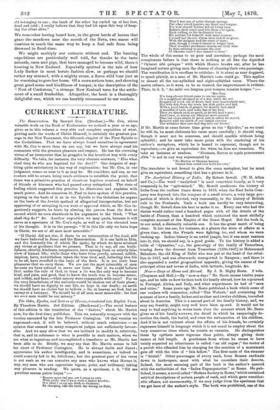CURRENT LITERATURE.
The Resurrection. By Samuel Cox. (Strahan.)—Mr. Cox, whose valuable work on the Book of Ecclesiastes we noticed a year or so ago, gives us in this volume a very able and complete exposition of what, putting aside the words of Christ Himself, is certainly the greatest pas- sage in the New Testament, the fifteenth chapter of the First Epistle to the Corinthians. That we have always found ourselves in agreement with Mr. Cox is more than we can say, but we have always read his comments with the greatest pleasure and respect. He has the crowning virtue of an interpreter that he grapples in the heartiest way with every difficulty. We take, for instance, the very obscure sentence, "Else what shall they do who are baptized for the dead?" One despairs of any- thing quite satisfactory in the way of explanation ; but Mr. Cox, in our judgment, comes as near to it as may be. He considers, and can, as our readers will be aware, bring much evidence to establish the point, that there was a primitive practice of vicarious baptism received on behalf of friends or kinsmen who had passed away unbaptized. The state of feeling which suggested this practice he illustrates and explains with much power. And he conceives St. Paul to have spoken of this practice, arguing on the basis of it as in the Epistle to the Galatians he argues on the basis of the Jewish method of allegorical interpretation, but not approving of or accepting want of approval which, as Mr. Cox in- geniously suggests, he hints by altering the person from the first or second which he uses elsewhere in his argument to the third, "What shall they do ?" dm. Another exposition we may quote, because it will serve as a specimen of Mr. Cox's style, as well as of the elevated tone of his thought. It is on the passage, "If in this life only we have hope in Christ, we are of all men most miserable."
"If Christ did not rise, if there be no resurrection of the dead, still we have believed in Jesus and the Resurrection. It is our faith in Him, and the heavenly life of which He spake, by which we have attained any virtue or goodness that we possess. That is to say, all our truth- fulness charity, kindness, temperance, have sprung from an utterly false view of human life ; while those who have been greedy, sensual, selfish, impious, have, nevertheless, taken the true view, and, believing this life to be all, have revelled in the lusts of the flesh. It is not their base pleasures that we envy them. We are not the most miserable of men because we have refused to serve our lusts. But if we could believe that, under the rule of God, to trust a lie was the only way to become kind, and pure, and good, that to know the truth was to become mean, and selfish, and base,—what misery were comparable with ours? For us the very foundations of the universe would be shaken out of their place ; we should have no dignity in our life, no hope in our death ; on earth we should have no choice but to believe a lie, in heaven no God, but an enemy or a betrayer. We should be of all men most miserable : for that we were men would be our misery."






























 Previous page
Previous page